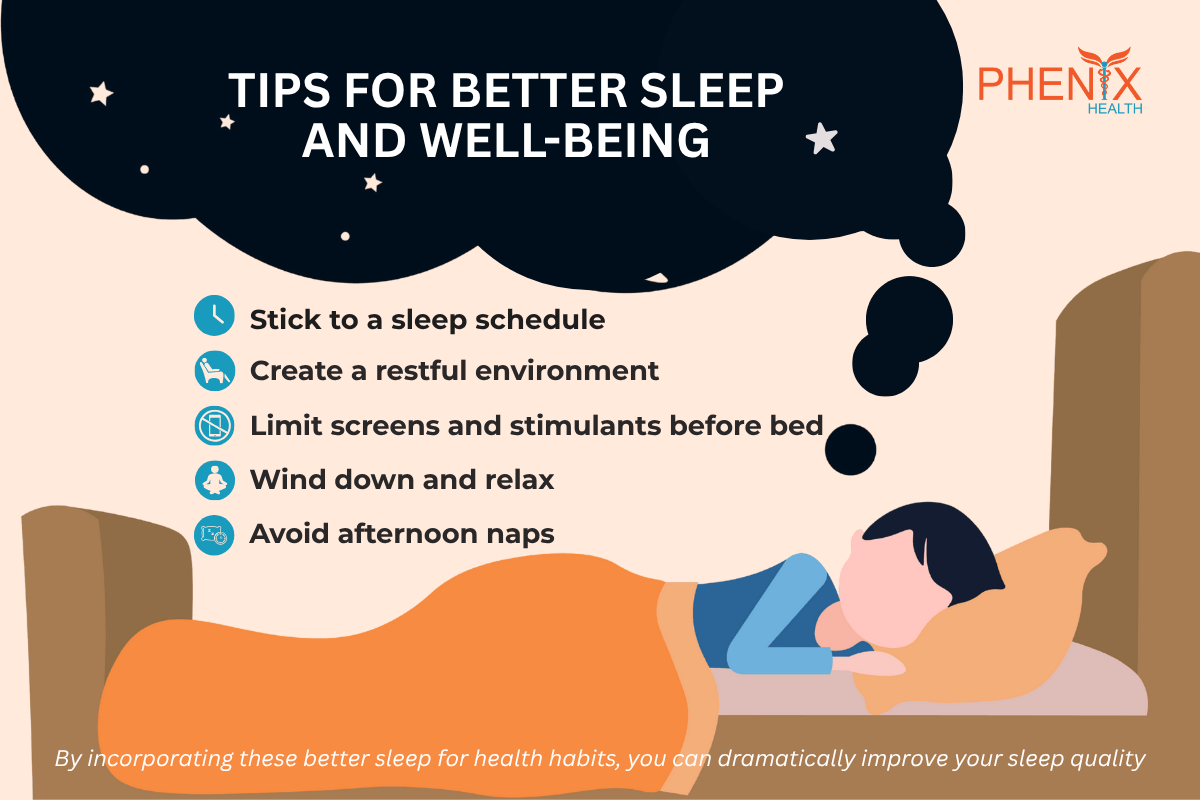Imagine waking up groggy and irritable after a late-night Netflix binge. Your day starts with a foggy brain and a second cup of coffee. We’ve all been there. Sleep often takes a back seat when life gets busy; however, sleep is important for both mental and physical health. In fact, health experts rank sleep alongside diet and exercise as one of the pillars of well-being.
With Sleep Health Week (Aug 11–15) emphasising “Sleep: The Lifelong Superpower”, now is the perfect time to understand the health benefits of sleep, and how poor sleep can contribute to anxiety, low immunity, and chronic conditions. This article explores why sleep matters for health and offers tips to sleep soundly for a healthier life.
Sleep and Mental Health
A good night’s sleep can work wonders for your mental health and emotional well-being. During sleep, the brain processes emotions and resets, helping you feel more balanced the next day. Moreover, adequate sleep improves your mood and emotional resilience, making you less prone to irritability and stress.
On the other hand, sleep deprivation is associated with higher levels of anxiety and even depression over time. Many people notice that when they are running on fumes, they feel more anxious, frazzled, or down. Consistently poor sleep can contribute to or exacerbate mental health issues – it’s a vicious cycle where poor sleep fuels poor mental well‑being, and vice versa.
The good news is that prioritising sleep can be a simple yet powerful way to boost your mental wellness. Waking up refreshed helps you face daily challenges with a stable mood and a clearer mind.
Sleep and Cognitive Performance
Ever struggled to focus after a sleepless night? You’re not alone. Sleep loss affects the brain’s ability to learn, concentrate, and make decisions. During quality sleep, your brain forms new pathways that improve memory and learning. Conversely, lack of sleep leaves you mentally foggy. You may have trouble focusing on tasks and solving problems.
Daytime fatigue and excessive daytime somnolence (drowsiness) from poor sleep can also impair your reaction time. This can be dangerous as studies link drowsy driving and on-the-job fatigue to a higher risk of accidents and errors.
In contrast, getting enough rest sharpens your attention and cognitive function, so you stay productive and alert. You’ll think more clearly, remember things better, and likely be more creative. Simply put, sound sleep is the secret to being on top of your mental game each day.
Sleep and Heart Health
Your heart and circulatory system appreciate a good night’s sleep. During deep sleep, your heart rate and blood pressure drop, allowing your cardiovascular system to rest and recuperate. On the flip side, chronic sleep deprivation is a risk factor for cardiovascular disease.
Research shows that people who regularly get less than the recommended 7–8 hours of sleep have a higher risk of high blood pressure, heart disease, and stroke. Inadequate sleep can keep your stress hormones elevated and increase inflammation that strains the heart.
For example, sleep apnea (a disorder causing breathing pauses at night) puts extra stress on the heart and is linked to hypertension and heart problems. Over time, poor sleep habits may contribute to plaque build-up in arteries and other cardiac issues.
The takeaway? Prioritising sleep is an easy way to support your heart health. Consistent quality sleep gives your heart the rest it needs, helping to keep your blood pressure in check and your cardiovascular system strong. (If you’re dealing with issues like high blood pressure, improving your sleep hygiene is a smart move – and consider speaking with a doctor.
Sleep, Metabolism and Weight Management
Struggling with weight or constant cravings? Your sleep might be part of the puzzle. Sleep plays a key role in regulating metabolism and appetite.
When you skimp on sleep, it throws hunger hormones out of balance, increasing ghrelin (which makes you feel hungry) and reducing leptin (which signals fullness). As a result, a sleep-deprived person is more likely to crave high-carb or sugary snacks for a quick energy boost. This can lead to overeating and weight gain.
In fact, not getting enough quality sleep has been linked to impaired insulin sensitivity and impaired glucose tolerance, which raises the risk of type 2 diabetes. Your body’s ability to process and store carbohydrates improves when you get sufficient restorative sleep.
Moreover, being overtired often means you’re too fatigued to exercise, creating a cycle that further affects physical health. By ensuring you get 7–9 hours of quality sleep, you help maintain a healthy weight and support your metabolism.
Think of good sleep as part of your weight management plan – alongside diet and exercise, it’s crucial for keeping your energy levels up and your waistline in check.
Sleep and Immunity
Have you noticed you tend to catch colds when you’re run-down? It’s not a coincidence – sleep and immunity are closely connected.
During sleep, your body produces and releases cytokines, which are proteins that help the immune system fight infection and inflammation. Lack of sleep can suppress this immune response. People who don’t get enough sleep are more likely to get sick after being exposed to viruses like the common cold.
Over the long term, chronic sleep deprivation can even reduce the effectiveness of certain vaccines. In contrast, quality sleep boosts your immune defences. It gives your body time to repair and strengthen its defences, so you’re better protected against illnesses.
Additionally, adequate sleep helps keep chronic inflammation in check, which is important because inflammation is linked to many chronic conditions. Researchers have found that good sleepers have cells that are quicker to recognise and attack germs.
Simply put, if you want to bolster your immune system, start by prioritising sleep. It’s an all-natural immunity booster that can help you get sick less often and recover faster when you do fall ill.
Tips for Better Sleep and Well-being

Improving your sleep is one of the best investments you can make in your health. Fortunately, cultivating better sleep habits doesn’t have to be complicated. Here are some tips to sleep soundly and wake up refreshed:
- Stick to a sleep schedule: Go to bed and wake up at the same time every day, even on weekends. A consistent routine helps regulate your body’s internal clock.
- Create a restful environment: Make sure your bedroom is dark, cool, and quiet. Consider comfortable bedding and limit any distractions.
- Limit screens and stimulants before bed: The blue light from phones, tablets, and TVs can trick your brain into staying alert. Turn off electronics at least 30–60 minutes before bedtime, and avoid late-night caffeine or heavy meals.
- Wind down and relax: Develop a calming pre-sleep routine. You might read a book, take a warm bath, or practice relaxation techniques. Gentle stretching or meditation can also signal to your body that it’s time to sleep.
- Avoid afternoon naps: While a short power nap can be refreshing, avoid long or late-afternoon naps that might interfere with nighttime sleep.
By incorporating these better sleep for health habits, you can dramatically improve your sleep quality. Small changes like a regular bedtime or cutting down on evening screen time can lead to big improvements in how you feel each day.
Prioritise Sleep, Prioritise Health: Support Is Just a Click Away
Healthy sleep matters. It’s the foundation of a strong mind and body. From lifting your mood and sharpening your focus to protecting your heart and strengthening immunity, sleep truly is a lifelong superpower for health.
If you’ve been skimping on rest, remember that it’s never too late to make sleep a priority and enjoy the benefits of sleep on your well-being. Phenix Health is here to help, too. Our doctors are available via telehealth to discuss sleep concerns or related health issues whenever you need support.
Book a consultation today and take the first step toward better rest and better health.






Phenix Health delivers online health services 24/7 provided by Australian doctors and healthcare professionals.